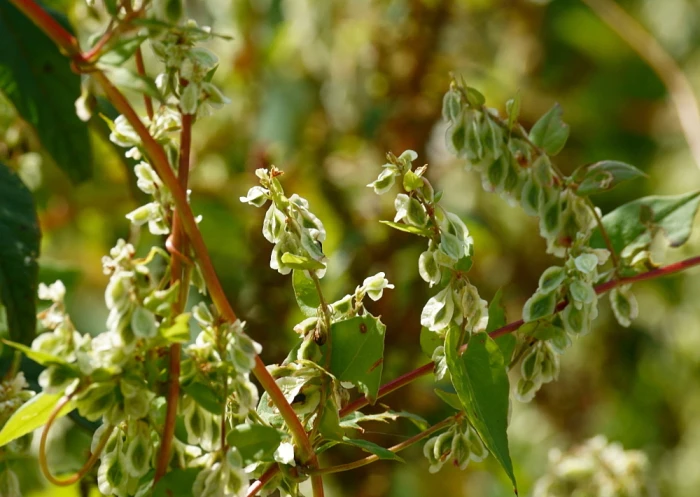Climbing False Buckwheat
/
(Fallopia scandens)
Climbing False Buckwheat (Fallopia scandens)
/

© psweet
CC BY-SA 4.0
Image By:
© psweet
Recorded By:
Copyright:
CC BY-SA 4.0
Copyright Notice:
Photo by: © psweet | License Type: CC BY-SA 4.0 | License URL: http://creativecommons.org/licenses/by-sa/4.0/ | Uploader: psweet | Publisher: iNaturalist |
























Summary
Fallopia scandens, commonly known as climbing false buckwheat, is an herbaceous perennial vine native to a variety of habitats including riverbanks, forest edges, and open woodlands across North America. It can grow vigorously, reaching heights of 3-16 feet, and is characterized by its twining stems that climb over other vegetation. The plant produces small, greenish-white flowers from late summer to early fall, which are not particularly showy but are followed by distinctive fruits that hang in clusters, providing visual interest in the landscape.
Climbing false buckwheat is valued for its ability to quickly cover structures or natural features, making it useful for erosion control on slopes or as a naturalizing element in garden settings. It thrives in a range of light conditions from full sun to part shade and prefers moist, well-drained soils. While it is not overly demanding in terms of care, gardeners should be aware of its potential to spread and should manage its growth accordingly to prevent it from becoming weedy. In some regions outside its native range, it is considered potentially weedy, so it is important to consult local regulations before planting.CC BY-SA 4.0
Climbing false buckwheat is valued for its ability to quickly cover structures or natural features, making it useful for erosion control on slopes or as a naturalizing element in garden settings. It thrives in a range of light conditions from full sun to part shade and prefers moist, well-drained soils. While it is not overly demanding in terms of care, gardeners should be aware of its potential to spread and should manage its growth accordingly to prevent it from becoming weedy. In some regions outside its native range, it is considered potentially weedy, so it is important to consult local regulations before planting.CC BY-SA 4.0
Plant Description
- Plant Type: Vine
- Height: 4-12 feet
- Width: 3-6 feet
- Growth Rate: Moderate
- Flower Color: Green, White
- Flowering Season: Summer, Fall
- Leaf Retention: Deciduous
Growth Requirements
- Sun: Full Sun
- Drainage: Medium
Common Uses
Bird Garden, Erosion Control, Low Maintenance
Natural Habitat
Native to riverbanks, forest edges, and open woodlands across North America
Other Names
Common Names: False Buckwheat, Eastern Climbing Buckwheat, Climbing Bindweed
Scientific Names: Fallopia scandens, Anredera scandens, Bilderdykia scandens, Bilderkya scandens, Fagopyrum scandens, Helxine scandens, Polygonum dumetorum var. scandens, Polygonum scandens, Polygonum scandens var. scandens
GBIF Accepted Name: Fallopia scandens
